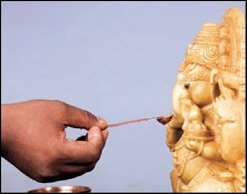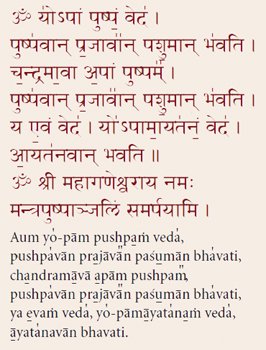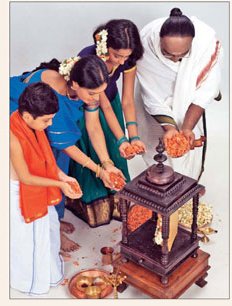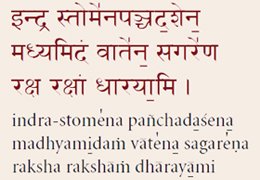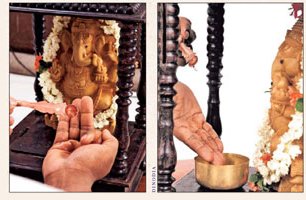HOME PUJA PREPARATION & PURIFICATION
| आचमनम् Āchamanam | Water Sipping By the Pūjāri |
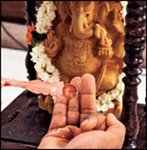 ॐ सुमुखाय स्वाहा
ॐ सुमुखाय स्वाहा
ॐ एकदन्ताय स्वाहा
ॐ गजकर्णकाय स्वाहा§
Aum sumukhāya svāhā
Aum ekadantāya svāhā
Aum gajakarṇakāya svāhā§
Aum! Hail to the God whose face is always shining!
Aum! Hail to the God who has only one tusk!
Aum! Hail to the God with huge elephant ears!§
Holding the spoon with your left hand, take a spoonful of water from the cup and place it in the right palm to rinse the hand, letting the excess fall onto the floor or a tray. Put another spoonful of water into the right hand, intone “Aum sumukhāya svāhā” and sip the water. Repeat for the second and third lines, then rinse the right hand again.§

| विघ्नेश्वर प्रार्थना Vighneśvara Prārthanā | Ganeśa Invocation |
ॐ सुक्लांबरधरं विष्णुं शशिवर्णं चतुर्भुजम् ।
प्रसन्न वदनं ध्यायेत् सर्वविघ्नोपशान्तये ॥§
Aum śuklāmbaradharam vishṇum
śaśivarṇaṁ chaturbhujam
prasanna vadanaṁ dhyāyet
sarvavighnopaśāntaye§
Aum. O Lord dressed in splendid white, pervading the universe, shining radiantly like rays of the full moon, having four mighty arms and a charming, happy face, we meditate on you that all obstacles may be quelled.§
Salute Lord Gaṇeśa by holding hands in añjali mudrā, the prayerful pose. Then, while reciting the verse, tap your temples lightly with your knuckles three times, as in the photo. Alternatively, you may cross your arms before your face, the left hand tapping the right temple and vice versa. Return your hands to añjali mudrā while reciting the last words of the chant.§

| संकल्पम् Saṅkalpam | Dedication of Pūjā Statement of Purpose |
ॐ अद्य पूर्वोक्त एवंगुणसकल
विशेषेण विशिष्टायां अस्यां शुभतिथौ
ॐ महागणेश्वर उद्दिश्य महागणेश्वरप्रीत्यर्थं
महागणेश्वरप्रसादसिद्ध्यर्थं
यथा शक्ति (name of city) देशे (period of day)
ध्यानावाहनादि गणेशपूजां करिष्ये ।
ॐ अप उपस्पृश्य §
Five periods of the day (insert one in chant)§
| उषः काल | ushaḥ kāla, dawn |
| प्रातः काल | prātaḥ kāla, morning |
| मध्याह्नकाल | madhyāhnakāla, noon |
| सायङ्काल | sāyaṅkāla, evening |
| ऊर्ध्वयामकाल | ūrdhvayāmakāla, night |
Aum adya pūrvokta evaṅguṇasakala
viśesheṇa viśishṭāyām asyāṁ śubhatithau
Aum Mahāgaṇeśvaraṁ uddiśya
Mahāgaṇeśvara prītyartham
Mahāgaṇeśvara prasāda siddhyartham
yathā śakti (chant city) deśe (insert the time of day)
dhyānāvāhanādi Gaṇeśa pūjāṁ karishye
Aum apa upaspṛiśya§
At this particularly auspicious moment, time and place, on this auspicious day, so that we may realize the fullness of your grace, to the best of our ability this (insert time of day) Gaṇeśa pūjā we shall now perform. Aum. By touching pure water we become pure.§
While reciting this statement of purpose, take a pinch of rice and hold it at chest height in your closed right palm, with open left hand underneath. Insert the time of day and the place where indicated. As you chant the last word, karishye, gently toss the rice toward the base of the image. Then, with the left hand, place a spoonful of water into your right palm and ritually wash both hands with the water by wiping the palms together a few times as you recite “Aum apa upa spṛiśya.” Once the saṅkalpam has been chanted, the pūjā must not be interrupted or abandoned until the concluding mantras are recited.§
WORKSHIP AND OFFERINGS BEGIN
| आवहनम् आसनम् Āvāhanam, Āsanam | Welcoming and Offering a Seat |
ध्यायामि । आवाहयामि ।
रत्नसिंहासनं समर्पयामि ।§
dhyāyāmi, āvāhayāmi, ratnasiṅhāsanaṁ samarpayāmi§
We now meditate on you, O Lord, and invite you to sit upon the jewel-studded, lion throne we have prepared for you. §
Offer a pinch of rice to the Deity as you chant each of the three words before “samarpayāmi.” Visualize Gaṇeśa seated on a gem-studded throne before you, smiling, full of blessings, waiting to be honored as a guest in your home.§

| अर्घ्यम् Arghyam | Washing the Lord’s Feet and Hands |
पादयोः पाद्यं समर्पयामि ।
हस्तयोः अर्घ्यं समर्पयामि ।§
pādayoḥ pādyam samarpayāmi
hastayoḥ arghyam samarpayāmi§
We now humbly bathe each of your white lotus feet and gently wash each of your precious hands, Lord Gaṇeśa.§
With your right hand offer a spoonful of pure water by holding it up before the Deity momentarily and then placing it in the tīrtha cup. This is how all water offering is done throughout the pūjā. As you chant the first line, visualize yourself bathing the feet of Gaṇeśa. Offer a second spoonful of pure water as you intone the next line and visualize yourself washing His hands. §

| आचमनम् Āchamanam | Offering Water to Quench His Thirst |
ॐ भूर्भुवः सुवः आचमनीयं समर्पयामि ।§
Aum bhūr-bhuvaḥ suvaḥ āchamanīyaṁ samarpayāmi§
Aum! In all three worlds, we humbly offer you fresh, pure water for sipping.§
Offer a spoonful of pure water to Gaṇeśa. Visualize His accepting it in His Hand and sipping it.§

| स्नानम् Snānam | Ritual Bathing |
 ॐ सुरसिन्धुसमानीतं सुवर्णकलशास्थितम् ।
ॐ सुरसिन्धुसमानीतं सुवर्णकलशास्थितम् ।
स्नानार्थं गृह्यतां शम्भो सलिलं विमलं गणेश ॥
गङ्गास्नानं समर्पयामि§
Aum surasindhu samānītam suvarṇakalaśāsthitam |
snānārthaṁ gṛihyatām śambho salilam vimalam gaṇeśa ||
gaṅgāsnānam samarpayāmi§
We now bathe you, beloved Lord Gaṇeśa, the pure one, with the water that was brought from the Ganges in the golden pot. We have bathed you in sacred Gaṅgā water.§
While ringing the bell and reciting this verse, dip a flower into the tīrtha water and gently sprinkle the Deity. Do this three times or more. Hold the flower in your right hand in the mṛigi mudrā, the stem between your third and fourth fingers. If the altar design allows, you may pour water over the mūrti, rather than sprinkling it during this chant. §

| अलङ्कारम् Alaṅkāram | Adornment and Offerings |
 वस्त्रार्थं मङलाक्षतान् समर्पयामि
वस्त्रार्थं मङलाक्षतान् समर्पयामि
उपवीतार्थं मङ्गलाक्षतान् समर्पयामि
ॐ गन्धं गृहाण सुरभिमन्धकासुरसूदन ।
कुङ्कुमदिसमायुक्तं कुलाचलनिकेतन ॥
दिव्य परिमल विभूति चन्दन कुंकुमं समर्पयामि§
vastrārtham maṅgalākshatān samarpayāmi
upavītārtham maṅgalākshatān samarpayāmi
Aum gandhaṁ gṛihāṇa surabhim andhakā surasūdana,
kuṅkumadi samāyuktaṁ kulāchalaniketana
divya parimala vibhūti chandana
kuṅkumam samarpayāmi§
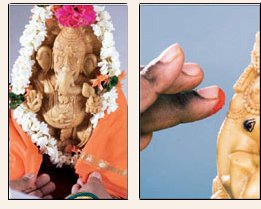 We give you this auspicious unbroken rice, our magnificent Lord, that you may enjoy resplendent clothing. We give you auspicious unbroken rice, Lord Gaṇeśa, that you may be handsomely adorned with a white, cotton sacred thread. Aum. O Lord, the destroyer of the demon Andhakāsura, you who resides in the Himālayas, please accept the good smelling chandana with kuṅkuma and choice offerings.§
We give you this auspicious unbroken rice, our magnificent Lord, that you may enjoy resplendent clothing. We give you auspicious unbroken rice, Lord Gaṇeśa, that you may be handsomely adorned with a white, cotton sacred thread. Aum. O Lord, the destroyer of the demon Andhakāsura, you who resides in the Himālayas, please accept the good smelling chandana with kuṅkuma and choice offerings.§
Dress the Deity. Offer a pinch of unbroken rice while chanting each of the first two lines. Repeat the third and fourth lines over and over as you decorate the Deity with flowers. The last line is recited once while applying vibhūti (holy ash), chandana (sandalpaste) and kuṅkuma. (red powder). §

| पुष्पम् Pushpam | Offering Flowers |
तदुपरि मङ्गलाक्षतात् समर्पयामि ।
पूजार्थम् नानाविधपत्र पुष्पाणि समर्पयामि ।§
tadupari maṅgalākshatān samarpayāmi pūjārtham nānāvidhapatra pushpāṇi samarpayāmi§
We now offer this auspicious unbroken rice. And for the fulfillment of our devotion, we offer many kinds of fresh, blooming flowers, our peerless Lord.§
A pinch of rice is offered with the first line. A handful of flowers is offered with the second.§

| धूपम् Dhūpam | Offering Incense |
ॐ वनस्पत्युद्भवैः दिव्यैः नानागन्धसमन्वितैः ।
आघ्रेयधूपदीपनां धूपो-यं प्रतिगृह्यताम् ॥
दशाङ्ग गुग्गुलोपेतं सुगन्धं सुमनोहरम् ।
आघ्रेयःसर्वदेवानां धूपो-यं प्रतिगृह्यताम् ॥
धूपमाघ्रापयामि धूपानन्तरमाचमनीयं समर्पयामि
मङ्गलाक्षतान् समर्पयामि §
Aum vanaspatyudbhavaiḥ divyaiḥ
nānāgandhasamanvitaiḥ,
āghreyadhūpadīpānām dhūpo-yam pratigṛihyatām.
daśāṅgam guggulopetam sugandhan sumanoharam,
āghreyaḥ sarvadevānām dhūpo-yam pratigṛihyatām.
dhūpamāghrāpayāmi
dhūpānantaram āchamanīyam samarpayāmi
maṅgalākshatān samarpayāmi§
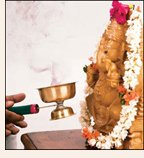 The finest incense, of magical qualities, of full and varied fragrances, Lord Gaṇeśa, we set aflame and offer to you in this, our home. Incense of the finest resins and perfumes, incomparable in sweetness and aroma, to be inhaled and enjoyed by you and all the Gods and devas, we offer to you in this, our home. Eagerly we offer to you, our resplendent Lord, fine resin incense, of heavenly odor, bewitching to the mind, rising out of a ghee-fed flame. We offer it to you in this, our home. This fine incense we have duly offered for your pleasure. And we again offer you cool, sweet water for sipping and auspicious unbroken rice.§
The finest incense, of magical qualities, of full and varied fragrances, Lord Gaṇeśa, we set aflame and offer to you in this, our home. Incense of the finest resins and perfumes, incomparable in sweetness and aroma, to be inhaled and enjoyed by you and all the Gods and devas, we offer to you in this, our home. Eagerly we offer to you, our resplendent Lord, fine resin incense, of heavenly odor, bewitching to the mind, rising out of a ghee-fed flame. We offer it to you in this, our home. This fine incense we have duly offered for your pleasure. And we again offer you cool, sweet water for sipping and auspicious unbroken rice.§
During this chant, make three circles before the Deity with lighted incense held in your right hand while ringing the bell with your left hand. Complete the third circle and trace an Aum as you chant the fifth line, dhūpamāghrāpayāmi. At that point raise the incense higher and ring the bell louder. Put the incense down, and recite the next two lines. With the first, water is offered, with the second, a pinch of rice.§

| दीपम् Dīpam | Offering The Light |
ॐ साज्यवर्तित्रयोपेतं प्राज्यमङ्गलदायकं ।
दीपं पश्य दयाराशे दीनबन्धो नमो-स्तु ते ॥
ॐ आवाहिताभ्यः सर्वभ्यो देवताभ्यो नमः ।
दिव्य मङ्गलदीपं सन्दर्शयामि ।
दीपानन्तरमाचमनीयं समर्पयामि ।
मङ्गलाक्षतान् समर्पयामि । §
aum sājyavarti trayopetam prājyamaṅgala dāyakam,
dīpam paśya dayārāśe dīnabandho namo-stu te.
aum āvāhitabhyaḥ sarvabhyo devatabhyo namaḥ,
divya maṅgala dīpaṁ sandarśayāmi,
dīpānantaramāchamanīyaṁ samarpayāmi,
maṅgalākshatān samarpayāmi§
O the Compassionate, the friend of devotees! See this lamp offered which is lighted with ghee and three wicks and which is the provider of abundant auspiciousness.
Salutations to you!
Aum! Salutations to all the Gods invoked! This divine, auspicious light we offer to you. After that, we offer you pure water for sipping and auspicious unbroken rice.§
Offer the oil light to Lord Gaṇeśa and ring the bell as you chant this hymn. As with the incense, circle three times then draw the Aum with the flame. Then raise the flame and ring the bell louder, then stop ringing. Offer water, then a flower or a pinch of rice. §

| नैवेद्यम् Naivedyam | Offering Food |
सत्यं त्वर्तेन (chant in morning)
ऋतं त्वा सत्येन (chant if evening) परिषिञ्चामि ।
ॐ अमृतमस्तु अमृतोपस्तरणमसि स्वाहा ।
ॐ गणेशाय  ।ॐ गणेशाय
।ॐ गणेशाय  ।
।
ॐ गणेशाय  ।§
।§
satyaṁ tvartena (chant if in morning)
ṛitaṁ tvā satyena (if evening) parishiñchāmi
Aum amṛitamastu amṛitopastaraṇamasi svāhā
Aum gaṇeśāya svāh , Aum gaṇeśāya svāh
, Aum gaṇeśāya svāh ,
,
Aum gaṇeśāya svāh §
§
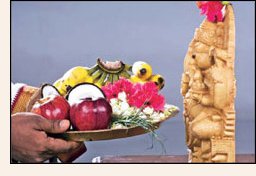 We add Truth to Truth. Aum. May this sweet and pungent food be transformed into nectar. We humbly offer to you this food. §
We add Truth to Truth. Aum. May this sweet and pungent food be transformed into nectar. We humbly offer to you this food. §
While reciting the first part of the mantra, uncover the food offering. Then, while chanting the last line and ringing the bell, circle a spoonful of water over the food and offer it to the Deity. While ringing the bell softly, gently waft the aroma and vital essences of the food or fruit toward the Deity. Do this by sweeping the right hand over the food with a flower held between your fingers, stem upward. The palm is facing downward as it moves over the food, then rotates upward as the sweep approaches the Deity, bringing the aroma and prāṇa toward His nose and mouth. As you complete the third line, gently toss the flower toward the feet of the Deity at the end of the sweep with all the love in your heart. §
ॐ आवाहिताभ्यः सर्वाभ्यो देवताभ्यो नमः ।
नानाविधमहानैवेद्यं निवेदयामि ।
यथाशक्तिसमर्पितमहानैवेद्यम् कृपया स्वीकुरु ।§
Aum āvāhitābhyaḥ sarvābhyo devatābhyo namaḥ,
nānā vidha mahānaivedyaṁ nivedayāmi,
yathāśakti samarpita mahānaivedyam kṛipayā svīkuru§
Aum! Salutations to all the Gods invoked! Because we are offering you our very best, Lord Gaṇeśa, in all sincerity and love, please consider the essence of this food as among the finest meals you have ever received. To the best of our ability in the worship of you, we offer this food and humbly beg that you will receive it.§
Ringing the bell loudly as you recite the above chant, pick up a flower or a pinch of rice and hold it at chest height in the fingertips of the right hand. As the last word is spoken, gently release the rice or flower at the feet of the Deity. Then put down the bell and raise your hands above your head in devout prayer that Gaṇeśa will accept the meal. While your hands are raised, close your eyes and visualize Gaṇeśa accepting and partaking of the meal. After a moment, lower your hands and intone Aum quietly.§

| विघ्नेश्वराष्टोत्तर शतनामावलिः Vighneśvarāshṭottara Śatanāmāvaliḥ | Chanting Gaṇeśa’s 108 Names |
In this section of the pūjā, chant the “garland of Gaṇeśa’s 108 names.” As you intone each name, offer with your right hand a flower, some flower petals or a pinch of rice. The names are attributes of the Deity, each delineating an aspect of His wondrous nature. Each name is preceded by the mantra Aum and followed by namaḥ , meaning “obeisance, adoration or homage to.” Thus the first line is chanted Aum Vināyakāya Namaḥ (pronounced, “na-ma-ha”).§
| विनायकाय | Vināyakāya ......the remover (of obstacles) |
| विघ्नराजाय | Vighnarājāya ......the ruler of obstacles |
| गौरीपुत्राय | Gaurīputrāya ......the son of Gaurī |
| गणेश्वराय | Gaṇeśvarāya ......the lord of categories |
| स्कन्दाग्रजाय | Skandāgrajāya ......Skanda’s elder brother |
| अव्ययाय | Avyayāya ......the inexhaustible one |
| पूताय | Pūtāya ......the pure one |
| दक्षाय | Dakshāya ......the dexterous one |
| अध्यक्षाय | Adhyakshāya ......the great presider |
| द्विजप्रियाय | Dvijapriyāya ......who loves the twice-born |
| अग्निगर्वच्छिदे | Agnigarvacçhide ......who destroyed fire’s ego |
| इन्द्रश्रीप्रदाय | Indraśrīpradāya ......who restored Indra’s wealth |
| वाणीप्रदाय | Vāṇīpradāya ......who gives eloquence |
| अव्ययाय | Avyayāya ......the inexhaustible one |
| सर्वसिद्धिप्रदाय | Sarvasiddhipradāya ......giver of fulfillment |
| सर्वतनयाय | Sarvatanayāya ......the son of Śiva |
| शर्वरीप्रियाय | Śarvarīpriyāya ......loved by Pārvatī |
| सर्वात्मकाय | Sarvātmakāya ......the soul of all |
| सृष्टिकर्त्रे | Sṛishṭikartre ......the creator |
| देवाय | Devāya ......the resplendent one |
| अनेकार्चिताय | Anekārchitāya ......worshiped by multitudes |
| शिवाय | Śivāya ......the auspicious one |
| शुद्धाय | Śuddhāya ......the pure one |
| बुद्धिप्रियाय | Buddhipriyāya ......who loves intelligence |
| शान्ताय | Śāntāya ......the peaceful one |
| ब्रह्मचारिणे | Brahmachāriṇe ......the celibate one |
| गजाननाय | Gajānanāya ......the elephant’s faced |
| द्वैमातुराय | Dvaimāturāya ......who has two mothers |
| मुनिस्तुताय | Munistutāya ......who is praised by sages |
| भक्तविघ्नवि नाशनाय | Bhaktavighna vināśanāya ....who destroys devotees’ obstacles |
| एकदन्ताय | Ekadantāya ....who has one tusk |
| चतुर्बाहवे | Chaturbāhave ....who has four arms |
| चतुराय | Chaturāya ....the ingenious one |
| शक्तिसंयुताय | Śaktisaṁyutāya ....united with power |
| लंबोदराय | Lambodarāya ....who has a large belly |
| शूर्पकर्णाय | Śūrpakarṇāya ....with fan-like ears |
| हरये | Haraye ....destroys evil with lion-like courage |
| ब्रह्मविदुत्तमाय | Brahmaviduttamāya ....foremost knower of God |
| कालाय | Kālāya ....the master of destiny |
| ग्रहपतये | Grahapataye ....lord of planets |
| कामिने | Kāmine ....who is love |
| सोमसूर्याग्नि लोचनाय | Somasūryāgni lochanāya .... whose eyes are the moon, sun and fire |
| पाशाङ्कुश धराय | Pāśāṅkuśa dharāya ....who holds a noose and a goad |
| चण्डाय | Chaṇḍāya ....who is fierce-looking |
| गुणातीताय | Guṇātītāya ....who transcends qualities |
| निरञ्जनाय | Nirañjanāya ....who is without blemish |
| अकल्मषाय | Akalmashāya ....who is without impurity |
| स्वयंसिद्धाय | Svayaṁsiddhāya ....self-fulfilled, perfect |
| सिद्धार्चितपदाम्बुजाय | Siddhārchita padāmbujāya ....whose lotus feet sages worship |
| बीजपूरफलासक्ताय | Bījapūraphalāsaktāya ....who is fond of pomegranates |
| वरदाय | Varadāya ....the boon giver |
| शाश्वताय | Śāśvatāya ....the eternal, unchanging one |
| कृतिने | Kṛitine ....the skillful one |
| द्विजप्रियाय | Dvijapriyāya ....fond of the twice-born |
| वीतभयाय | Vītabhayāya ....who is fearless |
| गदिने | Gadine ....who wields the mace |
| चक्रिणे | Chakriṇe ....who wields a discus |
| इक्षुचापधृते | Ikshuchāpadhṛite ....who holds a sugarcane bow |
| श्रीदाय | Śrīdāya ....the bestower of wealth |
| अजाय | Ajāya ....the unborn one |
| उत्पलकराय | Utpalakarāya ....who holds a proud blue lotus flower |
| श्रीपतये | Śrīpataye ....the Lord of wealth |
| स्तुतिहर्षिताय | Stutiharshitāya ....who delights in praise |
| कुलाद्रिभृते | Kulādribhṛite ....who supports Himālaya, His family’s mountain |
| जटिलाय | Jaṭilāya ....who has matted hair |
| कलिकल्मष नाशनाय | Kalikalmasha nāśanāya ....the destroyer of sins in the Kaliyuga |
| चन्द्रचूडामणये | Chandrachūḍāmaṇaye ....who wears a moon upon his head |
| कान्ताय | Kāntāya ....the beloved, loving one |
| पापहारिणे | Pāpahāriṇe ....the consumer of sins |
| समाहिताय | Samāhitāya ....absorbed in meditation |
| आश्रिताय | Āśritāya ....who is our refuge |
| श्रीकराय | Śrīkarāya ....who manifests prosperity |
| सौम्याय | Saumyāya ....the amiable one |
| भक्तवाञ्छित दायकाय | Bhaktavāñçhita dāyakāya ....the grantor of devotees’ desires |
| शान्ताय | Śāntāya ....the peaceful one |
| कैवल्य सुखदाय | Kaivalya sukhadāya .... bestower of unsullied liberation |
| सच्चिदानन्द विग्रहाय | Sacchidānanda vigrahāya .... embodiment of existence-knowledge-bliss |
| ज्ञानिने | Jñānine ....the great wisdom |
| दयायुताय | Dayāyutāya ....full of compassion |
| दान्ताय | Dāntāya ....who has self-control |
| ब्रह्मद्वेषवि वर्जिताय | Brahmadvesha vivarjitāya .... who is free from aversion to knowledge |
| प्रमत्तदैत्य भयदाय | Pramattadaitya bhayadāya ....who brings terror to demons |
| श्रीकण्ठाय | Śrīkaṇṭhāya ....with beautiful throat |
| विबुधेश्वराय | Vibudheśvarāya ....Lord of the Wise |
| रामार्चिताय | Rāmārchitāya ....worshiped by Rāma |
| विधये | Vidhaye ....who is the destiny of all |
| नागराज यज्ञोपवीतवते | Nāgarāja yajñopavītavate ....whose sacred thread is a king cobra |
| स्थूलकण्ठाय | Sthūlakaṇṭhāya ....of stout neck |
| स्वयं कर्त्रे | Svayaṁkartre ....who is self-created |
| सामघोषप्रियाय | Sāmaghoshapriyāya ....who loves the sound of Sāma Veda |
| परस्मै | Parasmai ....who is supreme |
| स्थूलतुण्डाय | Sthūlatuṇḍāya ....who has a stout trunk |
| अग्रण्ये | Agraṇye ....the leader |
| धीराय | Dhīrāya ....the courageous one |
| वागीशाय | Vāgīśāya ....the Lord of speech |
| सिद्धिदायकाय | Siddhidāyakāya ....bestower of fulfillment |
| दूर्वाबिल्व प्रियाय | Dūrvābilva priyāya ....who loves dūrvā grass and bilva leaves |
| अव्यक्तमूर्तये | Avyaktamūrtaye ....the manifestation of the Unmanifest |
| अद्भुतमूर्तिमते | Adbhutamūrtimate ....of wondrous form |
| शैलेन्द्रतनुजोत्सङ्ग खेलनोत्सुकमानसाय | Śailendratanujotsaṅga khelanotsukamānasāya ....who is happy to play in the lap of His mother, Pārvatī, daughter of the mountain Lord |
| स्वलावण्यसुधासारजित मन्मथविग्रहाय | Svalāvaṇyasudhāsārajita manmathavigrahāya ....who defeated Manmatha, the God of love, by His sweet beauty |
| समस्त जगदाधाराय | Samasta jagadādhārāya ....the supporter of all the worlds |
| मायिने | Māyine ....the source of illusory power |
| मूषिकवाहनाय | Mūshikavāhanāya ....who rides the mouse |
| हृष्टाय | Hṛishṭāya ....the joyful one |
| तुष्टाय | Tushṭāya ....the contented one |
| प्रसन्नात्मने | Prasannātmane ....the bright kindly-souled one |
| सर्वसिद्धि प्रदायकाय | Sarvasiddhi pradāyakāya ....the grantor of all fulfillment |

| मन्त्र पुष्पम् Mantra Pushpam | Worship With Flowers |
Aum Śrī Mahāgaṇeśvarāya namaḥ mantra pushpāñjaliṁ samarpayāmi§
The one who understands the beauty of the blooming powers of the Supreme Being is blessed with beautiful, blooming life, progeny and cattle. The moon is certainly the bloom of those powers. One who realizes the qualities of the moon, which are nothing but the blooming divine powers, is blessed with a blooming, beautiful life of perfection, progeny and cattle. One who realizes this principle and realizes the source from whom all these powers have come himself becomes the abode of those divine powers. Aum, salutations, Lord Mahāgaṇeśa, we respectfully offer you this flower mantra.§
While chanting this mantra, hold a handful of flowers before you in añjali mudrā, hands cupped loosely around the flowers at chest height. Recite the verses with adoration. As you intone the last word, samarpayāmi, lower your hands (as shown in the photo) and toss the flowers into the air above the murti, sending a shower of blossoms upon the God with feelings of gratitude and loving devotion.§

| आरती Āratī | Worship with Flame |
ॐ साज्यं त्रिवर्तिसंयुक्तं वह्निना योजितं मया ।
गृहान मङ्गलारतिं ईशपुत्र नमो-स्तु ते ॥
ॐ आवहिताभ्यः सर्वाभ्यो देवताभ्यो नमः ।
दिव्यमङ्गलदीपं सन्दर्शयामि ।
आचमनीयं समर्पयामि ।
मङ्गलाक्षतान् समर्पयामि । §
aum sājyaṁ trivartisaṁyuktam vahninā yojitaṁ mayā,
gṛihāṇa maṅgalāratim īśa putra namo-stu te.
aum āvāhitābhyaḥ sarvābhyo devatābhyo namaḥ
divya maṅgaladīpaṁ sandarśayāmi
āchamanīyaṁ samarpayāmi
maṅgalākshatān samarpayāmi§
 O Gaṇapati, Son of God Śiva, please accept this auspicious āratī prepared by me with ghee, three wicks and fire. My salutations to you! Aum! Salutations to all the Gods invoked! This divine, auspicious light we offer to you. After that, we offer you pure water for sipping and auspicious unbroken rice.§
O Gaṇapati, Son of God Śiva, please accept this auspicious āratī prepared by me with ghee, three wicks and fire. My salutations to you! Aum! Salutations to all the Gods invoked! This divine, auspicious light we offer to you. After that, we offer you pure water for sipping and auspicious unbroken rice.§
During this chant, hold the lit oil lamp or camphor burner in your right hand and the bell in your left. While ringing the bell and slowly reciting the āratī mantra, make three circles clockwise before Gaṇeśa with the flame. Stop at the top of the third circle, lower the lamp slightly and trace the symbol of Aum in Sanskṛit or in your native language. Then lift the flame slightly above the Aum that you placed in the ākāśic ether and ring the bell louder for all three worlds to hear. Keep ringing loudly while chanting the above two-line salutation to the devas (“āvāhitābhyaḥ … sandarśayāmi”). Put down the bell and the lamp and then, with the flame still burning, offer a spoonful of water with “āchamanīyaṁ samarpayāmi,” then a pinch of rice with “maṅgalāshatān samarpayāmi.” §

| रक्षधारणम् Rakshadhāraṇam | Prayer for Protection |
O Indra, Lord of material and spiritual prosperity, please protect the space between the heavens and earth as well as the mind between the body and the soul with the help of fifteen noble powers and virtues (five prāṇas, five jñānendriyas and five karmendriyas). Your protection and blessings sustain me.§
As you recite this mantra, make three circles above the burning flame with a flower held in the right hand, stem upward (photo next page). With the last words, toss the flower gently toward the Deity and place your hands in añjali mudrā while facing the altar. Now offer the flame at chest level to all present, allowing each to draw both hands through it and lightly touch the eyes three times (photo next page, upper right). The Gods and devas can see us through the flame and send blessings. If especially honored persons are present, such as one’s guru, parents or teacher, take the flame first to them. Then proceed clockwise to the others. In some cases, the pujārī may stand near the altar while devotees come forward to receive the flame. If no one is attending the pūjā, you may personally draw blessings from the flame, but not otherwise. Finally, present the flame once more to the Deity, then extinguish it with a wave of the right hand or by snuffing it out with a flower. §

| अर्पणम् Arpaṇam | Final Consecration |
अनया यथाशक्त्या कृत
(state period of day)
पूजया भगवान् सर्वदेवात्मकः
श्रीमहागणेश्वरः सुप्रीतः
सुप्रसन्नो वरदो भवतु§
anayā yathā śakti kṛita
(state period of day from list on page I-4)
pūjayā bhagavān sarva devātmakaḥ
śrī mahāgaṇeśvaraḥ suprītaḥ
suprasanno varado bhavatu§
To the best of our ability we have performed this (state time of day) pūjā and worshiped you, dear Lord, the brightest of all the Gods. May it please you. May it be enjoyed by you. Surrounded by your presence, we place ourselves in your care, loving Gaṇeśa. §
Before reciting the above verse, place a pinch of rice in your left palm, then transfer it to the right palm. Add to the rice three spoonfuls of water and close the hand (left photo). Hold the rice before you as you face the Deity, the left hand under the right hand, and recite the mantra. As you intone the last words, let the rice and water fall into the tīrtha cup (right photo). The sacraments may then be given out in the following order: holy ash, blessed water, sandalpaste, red powder, food and flowers. If no one is attending the pūjā, you may partake of the sacraments yourself, but not otherwise. If many devotees are attending, a second person may help pass out the sacraments, except for the holy ash, which is always given by the person who performed the pūjā.§

THOMAS KELLY§
Sharing the blessed offerings: at left holy ash is distributed, a small pinch into the right hand of each devotee; at right, the father of this household applies the sacred dot on his daughter’s forehead. §
Below, the family offers final prayers at the conclusion of their morning puja.§

| विसर्जनम् Visarjanam | Farewell and Apologies |
ॐ आवाहनं न जानामि न जानामि विसर्जनम् ।
पूजाञ्चैव न जानामि क्ष्म्यतां परमेश्वर ॥
मन्त्रहीनं क्रियाहीनम् भक्तिहीनं सुरेश्वर ।
यत् पूजितं मया देव परिपूर्णं तदस्तु ते ।
अन्यथा शरणम् नास्ति त्वमेव शरणम् मम ।
तस्मात् कारुण्यभावेन रक्ष रक्ष गणेश्वर ॥
ॐ तत् सत् ॐ §
Aum āvāhanaṁ na jānāmi na jānāmi visarjanam,
pūjāñchaiva na jānāmi kshamyatām parameśvara.
mantrahīnaṁ kriyāhīnam bhaktihīnaṁ sureśvara,
yat pūjitam mayā deva paripūrṇam tadastu te,
anyathā śaraṇaṁ nāsti tvameva śaraṇam mama,
tasmāt kāruṇyabhāvena raksha raksha gaṇeśvara.
Aum tat sat Aum.§
O Lord, we do not know the proper means of inviting you or, when taking our leave, how to wish you farewell. A full knowledge of priestly rites has not been imparted to us, so you must overlook and forgive any mistakes or omissions. We know little of mantras or pious conduct, and we are strangers to true bhakti. Nonetheless, please forgive us and regard our attempts as exact and complete—because you are our only refuge. With your compassionate nature, Lord Gaṇeśa, we beseech you, please protect those who pray. That which is Truth is Aum.§
This concluding apology is recited with hands in añjali mudrā. It is a formal and devout end to the worship service. As the final words, “Aum tat sat Aum,” are spoken, it is customary to clap your hands together three times. All may now prostrate. §
It is traditional and most uplifting to meditate for a few minutes after the pūjā, rather than rushing offer to daily duties. There is great personal benefit in such internalized worship, eyes closed, mind still, following, deep within yourself, the prāṇas that the pūjā has created. Externalized worship is the bhakti path; internalized worship is the yoga path. Both together make the complete circle that sustains devotees in their spiritual life, making them strong and kindly in moving the forces of the world in their daily life. This dual-pronged effort towards self-transformation and right living is the very foundation for the final goal of all seekers: moksha, freedom from rebirth. §



